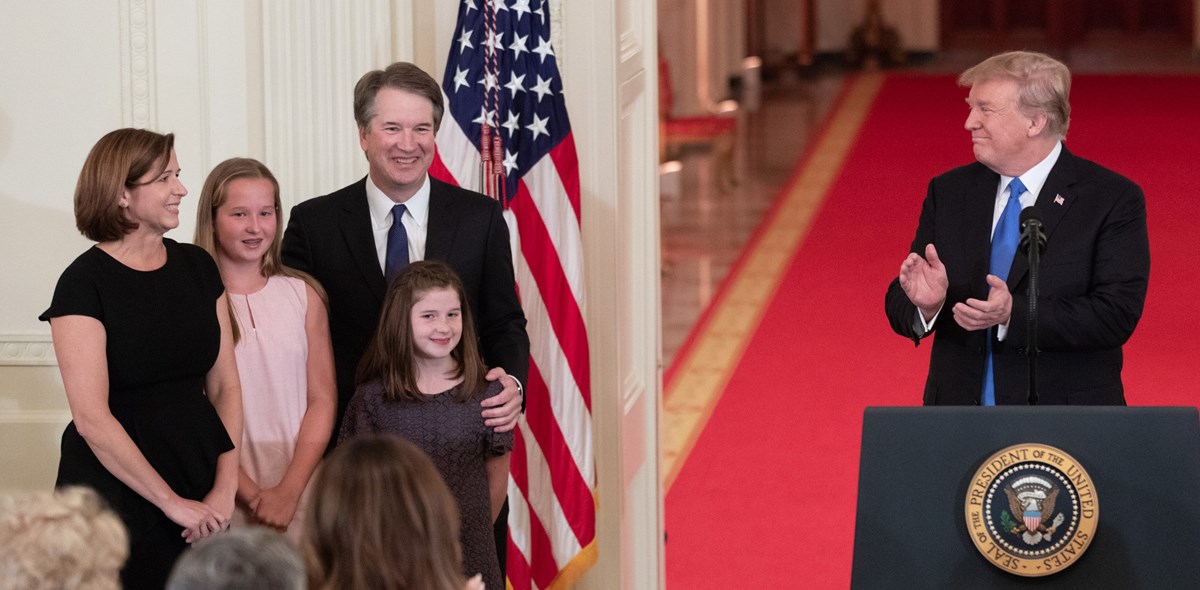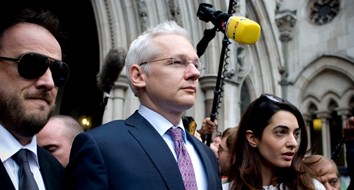My colleague, Brittany Hunter, recently wrote a wonderful article detailing several constitutional concerns surrounding Brett Kavanaugh, whose nomination to the Supreme Court is expected to receive a full vote before the U.S. Senate this weekend.
Kavanaugh’s nomination had stalled after college professor Christine Blasey Ford alleged Kavanaugh sexually assaulted her when they were teenagers, but an FBI investigation concluded on Wednesday found no facts to corroborate Ford’s claim, presumably clearing the way for a Senate vote.
Hunter’s concerns are not unfounded. Kavanaugh’s support of the Patriot Act should give constitutionalists pause. (Although it’s worth pointing out that several originalist Supreme Court justices—Clarence Thomas, Antonin Scalia, and Samuel Alito—also upheld the most controversial parts of the Patriot Act.)
Yet perhaps more concerning is Kavanaugh’s 2015 opinion in Klayman v. Obama, which upheld the government’s warrantless collection of metadata. While Kavanaugh’s opinion was consistent with previous Supreme Court rulings (see Smith v. Maryland, 1979), his sweeping statement “that critical national security need outweighs the impact on privacy occasioned” is hardly encouraging for defenders of the Fourth Amendment.
Still, it would be unfair—incomplete, at the very least—to judge Kavanaugh’s constitutional record on such narrow grounds. A broader analysis of his rulings suggests he would faithfully interpret and uphold the Constitution to protect individual rights, private property, and liberty in several key areas.
Property Rights
The great Leonard Read understood that private property is the cornerstone of civilization. Unfortunately, Read observed, few people seem to realize that “private ownership can be universally endorsed in principle and completely obliterated in practice.”
The truth of Read’s words was evidenced by the Supreme Court’s infamous 2005 opinion in Kelo v. New London. In a 5-4 ruling, the Court upheld the right of the city of New London, Connecticut, to use eminent domain to seize the private property of Susette Kelo (and other property owners) and sell it to land developers to enhance the city’s tax revenues. (The property has remained a vacant lot for decades.)
The ruling, which Sandra Day O’Connor said put “the specter of condemnation … over all property,” was supported by Justice Anthony Kennedy, whom Kavanaugh would replace on the High Court.
Fortunately, evidence suggests Kavanaugh holds a different view on property rights.
In his years as a Federal Appeals Court judge, Kavanaugh consistently protected the rights of intellectual property holders. He also, in a case that would go before the Supreme Court, used property rights as a defense against warrantless police surveillance.
Kavanaugh argued that the police action was unlawful, a violation of not just the suspect’s privacy but also his property rights.
Jones v. US involved the question of whether police could use a GPS device to track a suspect's car without a warrant. In his dissent, Kavanaugh argued that the police action was unlawful, a violation of not just the suspect’s privacy but also his property rights.
The defendant cited Kavanaugh’s argument when the issue went to the Supreme Court, the Washington Examiner points out, and the late Justice Antonin Scalia expanded on Kavanaugh’s property rights interpretation in the Court’s final decision, which held that the police action was unconstitutional.
"[O]ur law holds the property of every man so sacred, that no man can set his foot upon his neighbor's close without his leave,” Scalia wrote, citing Lord Camden; “if he does he is a trespasser, though he does not damage at all; if he will tread upon his neighbor's ground, he must justify it by law."
Free Speech
Kavanaugh has consistently upheld the First Amendment in his rulings. Brian Miller, a researcher at the Antonin Scalia Law School at George Mason University, notes that in key free speech cases Kavanaugh ruled “in favor of protecting speech each time.”
In Emily’s List v. FEC, for example, Kavanaugh, writing the majority opinion, struck down spending limits placed on the abortion advocacy group.
Ken White, a blogger and former Assistant United States Attorney, described Kavanaugh as “the most speech-protective justice on a quite speech-protective Court.”
Ken White, a blogger and former Assistant United States Attorney, described Kavanaugh as “the most speech-protective justice on a quite speech-protective Court.”
“Kavanaugh has been an appellate judge for 12 years and has written many opinions on free speech issues,” wrote White. “They trend very protective of free speech, both in substance and in rhetoric. His opinions are consistent with the Supreme Court’s strong protection of free speech rights this century.”
Kavanaugh’s record suggests he would provide crucial protection for free speech at a time when many elite and public universities are abandoning this fundamental freedom.
The Second Amendment
In 2010, in the wake of the Supreme Court’s pivotal Heller decision, which effectively applied the Second Amendment to the states, the District of Columbia passed a law that required gun owners to register their firearms, prohibited semi-automatic rifles, and banned magazines that held more than 10 rounds of ammunition.
When the law went before the U.S. Court of Appeals for the District of Columbia Circuit, it was upheld by a three-judge panel. Kavanaugh, however, issued a dissent, citing the High Court’s recent decision in Heller:
In Heller, the Supreme Court held that handguns—the vast majority of which are semi-automatic today—are constitutionally protected because they have not traditionally been banned and are in common use by law-abiding citizens. There is no meaningful or persuasive constitutional distinction between semi-automatic handguns and semi-automatic rifles. Semi-automatic rifles, like semi-automatic handguns, have not traditionally been banned and are in common use by law-abiding citizens for self-defense in the home, hunting, and other lawful uses. Moreover, semi-automatic handguns are used in connection with violent crimes far more than semi-automatic rifles are. It follows from Heller’s protection of semi-automatic handguns that semi-automatic rifles are also constitutionally protected and that D.C.’s ban on them is unconstitutional.
Kavanaugh’s ruling indicated he would have struck down the registration requirements and the ban on semi-automatic rifles, evincing undiluted support of the People’s right “to keep and bear Arms,” as stated in the Bill of Rights. (Regarding large-capacity magazines, Kavanaugh indicated the court should have sent the issue back to the lower court to gather additional information.)
Education
According to his 2004 testimony, The Atlantic reports, Kavanaugh “helped spearhead school-choice-related outreach efforts for the Federalist Society, a legal organization of conservatives and libertarians.”
This, along with the fact that Kavanaugh attended an elite Catholic school, is being touted by media and unions as evidence that Kavanaugh would be sympathetic to state and local efforts to expand school choice and voucher programs.
We often hear about the virtual monopoly public schools have on education. But such reforms will be difficult to achieve if a handful of justices decide that voucher programs are unconstitutional.
Liberty lovers are fond of talking about the need for school competition. We often hear about the virtual monopoly public schools have on education. But such reforms will be difficult to achieve if a handful of justices decide that voucher programs are unconstitutional.
There are compelling reasons to believe the state should never have been given control over education to begin with. But the system is arguably the most entrenched bureaucracy in America, and it will require jurists who are not hostile to competition, school choice, and the inherent federalism of the Constitution to allow reforms to move forward.
Judging from Kavanaugh’s support of school choice and work with the Federalist Society, he would oppose the kind of judicial activism that would snuff out educational reforms at the state and local levels.
Conclusion
Is Judge Kavanaugh’s voting record perfect? No. But I suspect if any person, senator or journalist, looks closely at any Supreme Court justice, she can find outcomes she may not agree with.
Yet it is not the job of the US Senate to confirm appointees with perfect voting records who would vote as they’d like. Article II, Section 2 of the Constitution states that the Senate shall offer “advice and consent” to the president’s nominee.
As such, senators should be seeking to answer one question: Would Justice Brett Kavanaugh faithfully interpret and uphold the Constitution?
Judge Kavanaugh’s record suggests he would.





